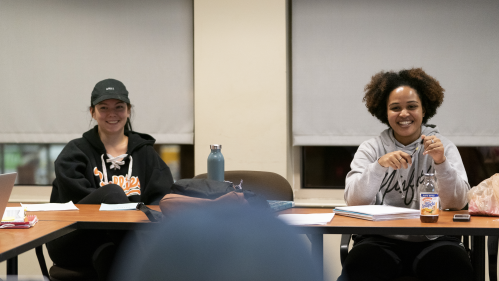
Bridging the Gap
New Jersey undergraduate students can reduce their college costs by up to 100% at Rutgers University–Camden. Through Bridging the Gap, supplemented by the Garden State Guarantee, you can greatly decrease or completely avoid student loan debt while working toward a Rutgers degree. Rutgers University–Camden has provided over $32 million in support to working class families from New Jersey.
How it Works
The Bridging the Gap program ensures that eligible students pay a fixed amount for their annual tuition and mandatory fees. Rutgers University–Camden applies this special “last dollar” financial aid program to the remaining costs of your in-state tuition and additional mandatory fees after any other need-based federal, state, and/or institutional aid has been applied. As the name suggests, this program bridges the gap between the financial support you received and the money you still owe by drastically reducing or eliminating your student debt. All figures are based on family-adjusted gross income (AGI).*
- Adjusted Gross Income (AGI): $0-65,000
- Students at this threshold will have an annual net cost (tuition and mandatory fees) of $0.
- Adjusted Gross Income (AGI): $65,001-80,000
- Students at this threshold will have an annual net cost (tuition and mandatory fees) of no more than $3,000.
- Adjusted Gross Income (AGI): $80,001-100,000
- Students at this threshold will have an annual net cost (tuition and mandatory fees) of no more than $5,000.

How to Apply
Applying to Bridging the Gap is easy!
There is no separate application for the program. Applicants who meet the criteria are automatically considered when they are admitted to Rutgers–Camden and complete the Free Application for Federal Student Aid (FAFSA).

Who is Eligible?
Bridging the Gap is open to new students that are enrolled and matriculated on a full-time basis** in degree programs at Rutgers–Camden working toward completing their first Bachelor's degree. Students must also fit into one of the following citizenship categories:
- New Jersey residents who are also U.S. citizens;
- Permanent U.S. residents with an I-151, I-551, or I-551c; or
- Recipients of New Jersey S2479 (the Tuition Equality Act/NJ Dream Act).
Students must complete federal, state, and institutional verification requirements.
Criteria for Annual Renewal
Students may renew their Bridging the Gap grant annually provided that they:
- successfully complete 30 credit hours in an academic year;
- remain in good academic standing; and
- complete the FAFSA every year.
This program is not transferable to other Rutgers campuses or off-campus Rutgers programs. Bridging the Gap is a Rutgers–Camden only program. (Please note that developmental courses that are successfully passed will be counted toward a student’s 30 earned credits per academic year requirement.)
Eligible students who began at Rutgers–Camden between Fall 2016 and Spring 2022 can check the Bridging the Gap renewal requirements before the Fall 2022 expansion.

History of Bridging the Gap
In 2015, the Bridging the Gap program was announced and became the first of its kind among New Jersey’s public four-year colleges and universities. It has helped over 1,200 students gain access a world-class education where they get to do hands-on work with faculty that are leaders in their field. With the creation of the Garden State Guarantee (GSG) in 2022 by the State of New Jersey, we seized the opportunity to expand our Bridging the Gap program by improving upon the funding guaranteed by the GSG and opened up Bridging the Gap to 1st and 2nd year students to match GSG.





*Families with a negative Adjusted Gross Income (AGI) are not eligible.
** Students must be enrolled full time (at least 12 credits per semester) and must be working toward completing their first Bachelor’s degree.